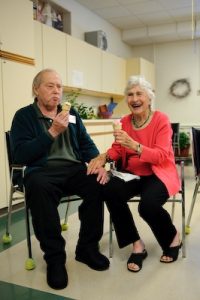 Language has slowly evolved in a positive way in dementia care. In the 1800s and later, the language for the care of a person with dementia was very demeaning! A person was cared for as a nonperson and often put away in an insane asylum.
Language has slowly evolved in a positive way in dementia care. In the 1800s and later, the language for the care of a person with dementia was very demeaning! A person was cared for as a nonperson and often put away in an insane asylum.
Then later there was the top-down approach. You have a problem and I am here to be in charge of you, the patient! No one wants that kind of treatment. The person is not a perpetual patient, only when seeking medical attention. The language of patient-centered care is slowly becoming obsolete.
‘Person-centered care’ was a real step forward. Person-centered care can put the emphasis on the person, performing tasks needed for the person. But person-centered care does not necessarily include a friend, a relationship, what the person most needs and wants. It can be a check list of things to do with and for the person but not include being present as a friend. This term is giving way to the ‘relationship-centered care’ approach.
Two years ago I spent two months in rehab with a fractured spine and a broken leg. It was January. The nights were long, dark and cold and I was in a hard helmet in deep pain! The CNAs came throughout the night to check on me. Most of them were young, some were interns from their school and all of them were dedicated to their assignments. Some did their work well, but as a chore to be accomplished, like marking each task off their to-do list. Others brought a presence that I could feel. They learned my name, gave me a pat on the shoulder, or were just present for me. This is relationship-centered care!
The Best Friends™ Approach is relationship-centered care. Language does make a difference. When you hear the language of relationship it brings good feelings just as the person with dementia feels when the two of you are friends. Be a part of changing the history of the language of dementia care!